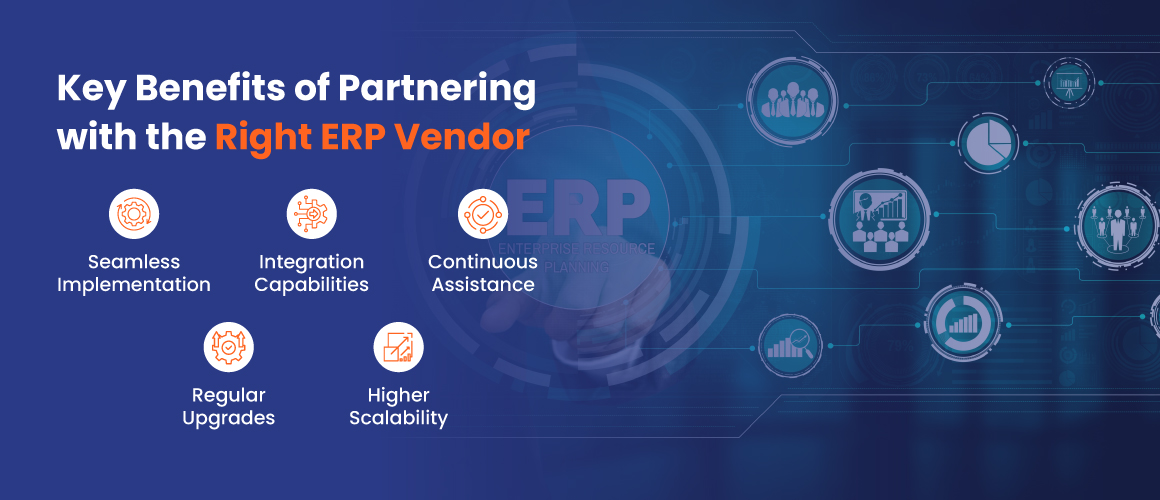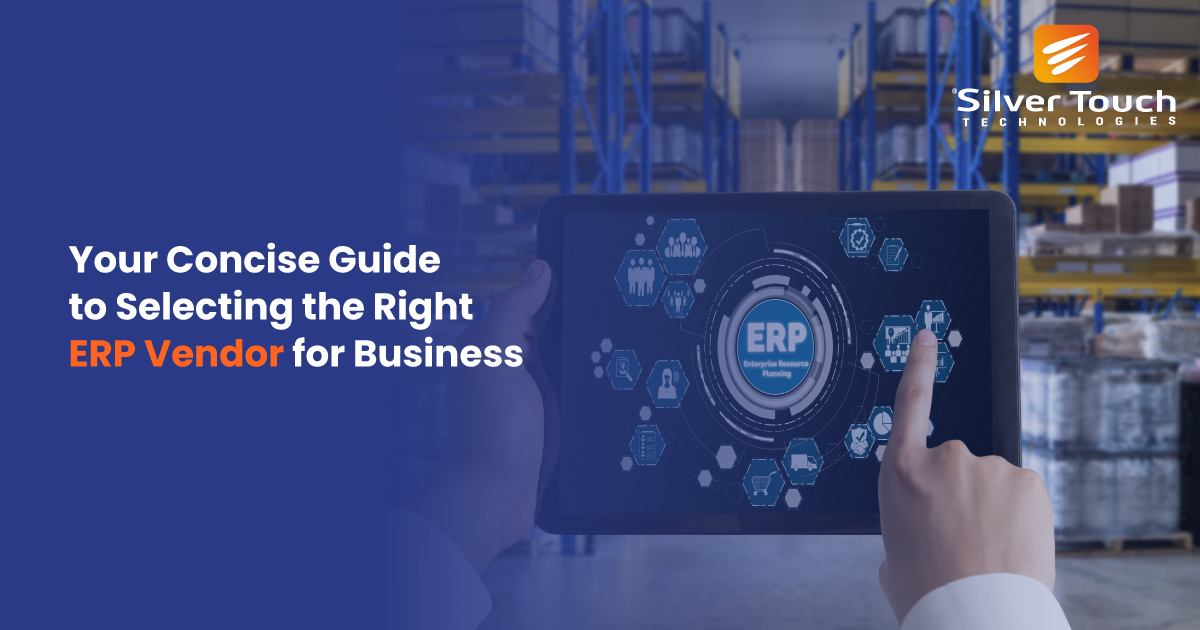Introduction
Intensifying competition and ever-changing needs of customers make the company’s growth journey highly challenging. SMEs feel the hit with limited resources and budget constraints. In such a complicated scenario, cloud-based ERP solutions like SAP Business One Cloud come as a savior. However, it is essential to select the right vendor to address business challenges effectively for leveraging the benefits of these ERP solutions.
This post explores the reasons why you should choose the right ERP vendor for your company. Let’s start by discussing the scope and key features of cloud-based ERP solutions for modern businesses.
Adoption of Cloud-Based ERP in Modern Businesses
Cloud based ERP solutions can streamline operations, save operational costs, and improve decision-making in modern businesses. As a scalable and flexible solution, a cloud-based ERP can eliminate the need for investing heavily in infrastructure.Some of the major reasons behind the increasing adoption of a cloud ERP include its remote accessibility and the capability of giving data-driven insights. Moreover, subscription-based pricing of robust ERP solutions like SAP Business One Cloud can reduce TCO (Total Cost of Ownership). Advanced ERP solutions get updates regularly and automatically to keep the enterprises ready to meet compliance standards and protect their data.
Whether it is manufacturing or retail, all core industry sectors can leverage the benefits of cloud ERP software solutions. These solutions can handle key functions, including supply chain, inventory, finance, and customer relationship management. As more companies opt for digital transformation to drive growth, the adoption of such ERP solutions will increase. Let’s dig deep into the necessary and common features you should look for in a cloud-based ERP software.
Essential Features of Robust Cloud-Based ERP Solution
A cloud-based ERP solution should be secure, scalable, and easy to use for SMEs. Moreover, it should have integration capabilities with data analytics functionality to enhance the decision-making process. Here is a glimpse of some essential features of cloud ERP software solutions-
Cloud-based ERP software has core business modules like supply chain and inventory management, customer relationship management, HR & payroll, and finance & accounting. It has an interactive dashboard with predictive analytics. Advanced SAP Business One Cloud solutions have AI/ML integrations to forecast demands and analyze trends effectively.
Furthermore, these solutions offer features like workflow monitoring, mobile access, and role-based permissions for team members. End-to-end encryption, multi-factor authentication, and effective backup systems make a cloud-driven ERP solution highly secure.
Finally, when you select the right ERP solution for your company, make sure that the vendor offers regular updates and maintenance services. Transparent pricing and subscription model facilities are essential to check before selecting the most suitable ERP solution for your company.
Industry-Specific ERP Capabilities to Consider
Modern enterprises face unique yet dynamic challenges, and therefore, it is essential to choose an ERP solution with industry-specific, tailored capabilities. For example, the manufacturing sector needs cloud-based ERP solutions that have features like production planning, quality management, and shop floor control. On the other hand, retailers need POS integration and omnichannel inventory management features.
Apart from this aspect, a heavily regulated sector like healthcare needs modules for regulatory compliance and patient data security. Financial services need built-in features like risk management and compliance reporting. Industry-specific ERP features can reduce the need for customization and costs. Furthermore, such ERP solutions align closely with sector requirements, market trends, and regulations.
However, companies must choose a reputable vendor to get highly specialized ERP solutions that can offer faster ROI and higher efficiency.
Why Vendor Selection is Critical for ERP Success
Selecting the right ERP partner is imperative to ensure successful ERP implementation. A reliable vendor has experience of many years with expertise in industry-specific ERP solutions. As ERP systems touch every aspect of business, it is crucial to choose the most suitable vendor for seamless deployment and after-sales support.
Moreover, cloud-based ERP software solutions need system upgrades regularly. When you choose the right partner, you can remain assured of training, updates, technical assistance, and compliance with changing standards. The right ERP partner can also enable your company to leverage the benefits of emerging technologies like AI, IoT, and ML.
Let’s discuss the top business benefits of partnering with the right ERP vendor for your company.
Key Benefits of Partnering with the Right ERP Vendor

The right ERP partner plays a vital role in deploying a tailored ERP and ensures its success in terms of higher ROI. Some major business benefits of partnering with the most suitable ERP vendor include-
Seamless Implementation
This is one of the biggest business benefits of partnering with an experienced ERP vendor. Such a reliable vendor brings proven methodologies to reduce the risk of delays and cost overruns while implementing cloud ERP software solutions.
Higher Scalability
A reputable vendor offers a highly customized and scalable ERP solution that can grow with your business. It also supports exploration of new markets with features based on emerging technologies, like AI and IoT.
Continuous Assistance
The right vendor arranges dedicated training sessions with extensive troubleshooting and post-implementation support. In a way, companies can ensure better user adoption and gain the advantage of cutting-edge features.
Regular Upgrades
The vendor can keep your ERP updated with the latest features and security patches. It is essential to strengthen corporate data security and meet compliance-related requirements effectively for a long time.
Integration Capabilities
A reliable vendor can help your company integrate the ERP solution with existing tools like BI and CRM for better coordination. Such integration can assist you in getting rid of operational silos and inefficiencies.
So far, we have understood the importance and benefits of selecting the right partner for implementing cloud-based ERP solutions. If you are ready to choose the right vendor after reading this much, we will give you some tips and steps for evaluating such a vendor.
Evaluating a Vendor Matches Your Business Needs
Every industry has unique requirements and operational workflows. While evaluating an ERP vendor for your company, you need to consider these aspects. Additionally, you need to research the vendor’s track record, customization abilities, integration capabilities, and post-implementation support. You can evaluate the vendor by reviewing their technology roadmap and security standards.
Finally, you should make sure that the vendor offers a robust ERP solution, like SAP Business One Cloud, that supports future growth and addresses relevant regulations.
Top Steps to Select and Onboard a Cloud ERP Vendor
Here are the key steps for selecting and onboarding the right Cloud ERP vendor.
Define Business Needs
You need to identify business goals and must-have features in the ERP solution as per your industry-specific requirements.
Research and Shortlisting
You can explore available ERP vendors and shortlist them on the basis of reputation, scalability, and industry expertise.
Evaluate Capabilities
You can research more about integration capabilities, security standards, and other abilities of the shortlisted vendors.
Assess Costs with ROI
It is necessary to review pricing models and check the budget before selecting the right vendor for ERP solutions.
Negotiate and Finalize
You can clarify several aspects, like SLAs, support, upgradation, and customization options, before selecting the ERP partner.
Onboarding and Training
You should plan the data migration, user training, and phased implementation with the help of a selected ERP solution provider.
Support and Monitoring
It is always beneficial to maintain regular communication with the vendor for updates and issue resolution effectively.
This step-by-step process will certainly help you choose the most suitable ERP partner for your company.
Concluding Remarks
It is essential to choose the right partner for implementing a cloud-based ERP software solution. You can evaluate vendors by researching their track records and industry expertise. As ERP implementation is a long-term project, it is necessary to consider all the aspects, including your business needs and the vendor’s scalability capabilities. Choosing the right vendor is a cumbersome process, but this step-by-step guide and tips will help you accomplish it.
Silver Touch Technologies US is a leading cloud ERP solution provider. As an official SAP Partner, we assist you in leveraging the advantages of the SAP Business One Cloud solution. Contact us to learn more about the scope of a customized ERP for your company and the right solution to drive growth.



